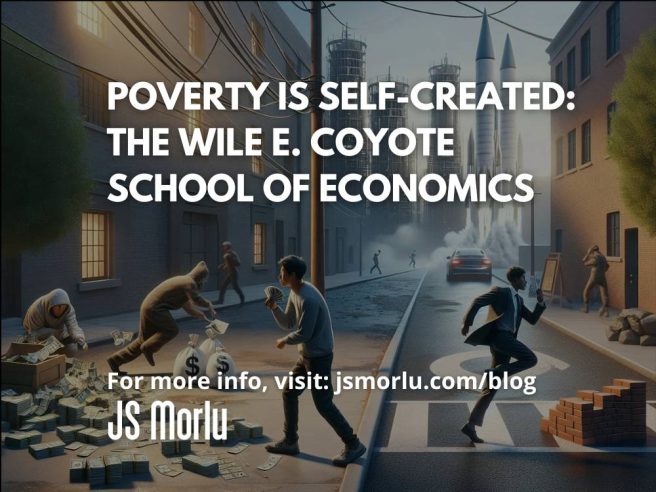By: John S. Morlu II, CPA
Let’s say it plain: poverty is not always inherited, structural, or divine punishment. Many times, it’s self-manufactured, hand-stitched, and carefully curated like a bad Netflix series no one asked for. People think they can outsmart everyone — family, friends, employers, governments — forgetting one crucial law of life: every manipulation has an expiration date.
Like Wile E. Coyote sprinting confidently off a cliff, they’re in the air for a few seconds — chest out, arms swinging, believing gravity doesn’t apply to them. Then, reality looks them in the eye and says: “Sir, ma’am, your credit has expired.” Boom. Down they go.
The Poverty Toolkit: How to Manufacture Your Own Misery
1. The Professional Manipulator
These folks treat relationships like ATMs. Every interaction is about withdrawal, never deposit. They think loyalty is optional, but handouts are mandatory. They forget that even the most generous system eventually adds fees — and then shuts the account.
2. The Perpetual Shortcut Hunter
Why work when you can cheat? Why save when you can borrow? Why plan when you can gamble? It looks brilliant at first. But shortcuts, like cheap glue, never hold. By the third collapse, everyone sees the pattern. The shortcut hunter is still running in circles while others are walking steadily forward.
3. The “Free Forever” Thinker
They milk opportunities as if they are permanent — free housing, free favors, free goodwill. But nothing in life is truly free; someone is paying. And when that someone gets tired, the free-rider discovers the cruelest rent: independence.
Fun Fact: The History of Poverty Games
- In ancient Rome, bread and circuses kept the masses happy, but when the bread ran out, riots broke out. Turns out you can’t “game” an empty stomach.
- During the dot-com bubble, everyone thought they’d outsmart the system with stocks that had no revenue. Spoiler: gravity worked there too.
- In every village, town, or corporate office, the gossip king or queen believes manipulation is a career. Until the day the promotion list comes out, and their name is nowhere.
Real-World Punchlines
- Business Example: That employee who lies about timesheets — clever once, discovered twice, jobless the third.
- Street Example: The hustler who scams neighbors for quick cash, only to be banned from every corner shop. Suddenly, their greatest enemy isn’t poverty, it’s their reputation.
- Family Example: The cousin who always borrows but never pays back. Eventually, even grandma stops answering the phone. Poverty has RSVP’d to stay permanently.
Common Sense Check
You can’t game forever. Systems catch on. People wise up. Opportunities move on. The idea that “I can manipulate my way to success” is the fastest road to self-inflicted poverty. Poverty here isn’t about lack of money; it’s about lack of foresight. And foresight is the one asset manipulation can never create.
Closing Satire: The Wile E. Coyote Economy
Picture it: a man running full speed, carrying a bag of tricks labeled “Lies, Excuses, Manipulation.” He outruns his friends, brags about outsmarting the system, and laughs at those “foolish” steady workers. Then suddenly — cliff. He looks around, realizes nothing is under him, and holds up a sign: “HELP.”
Too late. Poverty isn’t always inherited — sometimes, it’s handcrafted, with every bad decision stitched neatly together.
Contrast: Builders vs. Gamers
While manipulators were busy digging their own holes, the titans of industry were laying bricks skyward.
- John D. Rockefeller built the world’s largest oil empire not by gaming his cousins for $50 loans, but by reinvesting, reinvesting, and reinvesting again. He made more money in kerosene drops than manipulators made in a lifetime of excuses.
- Andrew Carnegie didn’t spend his life plotting tricks against the steel mills. He mastered efficiency, expanded relentlessly, and then gave away much of his fortune. The manipulator, meanwhile, is still arguing with his landlord about unpaid rent.
- J.P. Morgan had one trick: trust. If J.P. Morgan vouched for you, Wall Street moved. If he distrusted you, game over. Manipulators never understand that credibility is the only collateral that appreciates with age.
- Cornelius Vanderbilt was nicknamed The Commodore not because he scammed a ferry ticket, but because he outworked and out-thought every rival on the rivers and railroads. Meanwhile, the perpetual shortcut hunter is still trying to borrow bus fare.
Fast-forward to today:
- Elon Musk builds rockets and cars while the manipulator builds stories. Rockets reach Mars. Stories crash by Tuesday.
- Jensen Huang turned NVIDIA into a $4 trillion giant by betting on GPUs when everyone else thought it was a toy. Manipulators bet on sympathy. Spoiler: sympathy doesn’t compound.
Modern Street-Level Builders
It’s not just billionaires who prove the point — ordinary people do too.
- The immigrant shopkeeper who arrives with $200, works 14-hour days, and slowly builds a grocery empire. Ten years later, his children go to college debt-free. Meanwhile, the manipulator cousin is still “borrowing” gas money.
- The app coder who teaches herself online, builds a small SaaS tool, and sells it for six figures. No scams, no shortcuts — just sweat equity. The manipulator is still on Facebook asking strangers for “urgent help.”
- The food vendor who starts with one pushcart and ends up with a chain of restaurants because consistency beats trickery every time. While they’re serving loyal customers, the manipulator is serving excuses.
- The tailor or seamstress who builds clientele stitch by stitch, reputation by reputation. Compare that to the free-forever thinker who still owes neighbors for borrowed clothes they never returned.
African Builders Who Prove the Point
- Aliko Dangote started as a small trader of cement and sugar. Today, he runs the largest industrial empire in Africa. Manipulators begged for loans; he built factories.
- Strive Masiyiwa fought government monopolies for years to build Econet Wireless. Manipulators whined about unfairness; he kept building towers until the whole continent was connected.
- Mo Ibrahim created Celtel, sold it for billions, and then launched a foundation for African governance. While manipulators were gaming elections, he was funding democracy.
- Bethlehem Tilahun Alemu began with a small shoe business in Ethiopia, turning recycled materials into global fashion. Manipulators mocked her; now her brand exports worldwide.
- Patrick Ngowi in Tanzania started selling mobile phone vouchers on a bicycle and grew into a solar energy company supplying clean power. Manipulators looked for free electricity; he sold the real thing.
The Final Punchline
Manipulators think they’re clever. But clever doesn’t scale. Builders scale. History doesn’t remember the smooth-talking cousin who “borrowed and forgot.” History remembers the people who created systems, not games.
That’s why poverty is so often self-created. Manipulation is a business model that has only one guaranteed customer: failure.
Author: John S. Morlu II, CPA is the CEO and Chief Strategist of JS Morlu, leads a globally recognized public accounting and management consultancy firm. Under his visionary leadership, JS Morlu has become a pioneer in developing cutting-edge technologies across B2B, B2C, P2P, and B2G verticals. The firm’s groundbreaking innovations include AI-powered reconciliation software (ReckSoft.com) and advanced cloud accounting solutions (FinovatePro.com), setting new industry standards for efficiency, accuracy, and technological excellence.
JS Morlu LLC is a top-tier accounting firm based in Woodbridge, Virginia, with a team of highly experienced and qualified CPAs and business advisors. We are dedicated to providing comprehensive accounting, tax, and business advisory services to clients throughout the Washington, D.C. Metro Area and the surrounding regions. With over a decade of experience, we have cultivated a deep understanding of our clients’ needs and aspirations. We recognize that our clients seek more than just value-added accounting services; they seek a trusted partner who can guide them towards achieving their business goals and personal financial well-being.
Talk to us || What our clients says about us





